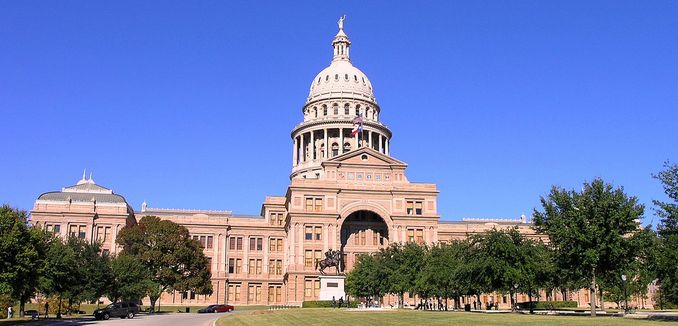The governor of Texas said that he was “proud” to honor Israel’s 69th Independence Day on Tuesday by signing a bill that would prevent state agencies from doing business with companies that discriminate against the Jewish state.
Gov. Greg Abbott said in a statement that he was “proud to have commemorated Israel’s Independence Day by signing into law Anti-[Boycott, Divestment, and Sanctions] legislation.” The law was approved unanimously by the Texas House of Representatives on April 21, and passed the state’s Senate with a 25 to 4 vote last week.
“As Israel’s number one trading partner in the United States, Texas is proud to reaffirm its support for the people of Israel and we will continue to build on our historic partnership. Anti-Israel policies are anti-Texas policies, and we will not tolerate such actions against an important ally. I would like to thank Rep. Phil King and Sen. Brandon Creighton for their work and commitment in authoring this important legislation,” Abbott said.
Texas is a friend with Israel. Texas is not going to do business with any company that boycotts Israel. #txlege https://t.co/JEH9zUslco
— Greg Abbott (@GregAbbott_TX) May 2, 2017
Charles Kaufman, the head of B’nai B’rith’s International Center for Human Rights and Public Policy, testified on behalf of the legislation and told The Jerusalem Post: “Advocates of BDS would do well to learn from the robust business relationship Texas enjoys with the State of Israel. The path to peace is not through hatred, false narratives, boycotts or terrorism. States like Texas won’t fall for such nonsense. It is only fitting that this bill becomes law in the same week that the Texas-Israel Chamber of Commerce has arranged for Israeli experts to present a forum at Texas State University on how the state can leverage Israeli water technology to meet future water challenges in Texas.”
Other anti-BDS bills have become law in Michigan, Pennsylvania, Illinois, South Carolina, Arizona, Georgia, Colorado, Florida, Alabama, California, New Jersey, Ohio, Rhode Island, Arkansas, and Iowa. New York governor Andrew Cuomo approved a similar measure by executive order.
Advocates of these measures have emphasized that they do not raise any First Amendment issues, as private parties are still free to protest, boycott, or speak out against Israel in any way. However, states may be obligated to protect taxpayer money from being used to promote or support discrimination based on religion, race, or nationality.
The passage of anti-BDS legislation reflects an understanding that the campaign “is not like the civil rights protests, as its supporters love to claim, but rather more like the anti-Jewish boycotts so common in Europe in the 20th century, and in the Arab world until this day,” Northwestern University law professor Eugene Kontorovich wrote in The Washington Post in 2015.
German Chancellor Angela Merkel’s political party, the Christian Democratic Union, echoed this criticism in December, passing a resolution stating that the party “declares with this motion its disapproval and rejection of every form of BDS activity and condemns these activities as anti-Semitic.”
Many BDS leaders have publicly opposed the two-state solution and affirmed that the movement seeks Israel’s destruction. Omar Barghouti, the co-founder of the movement, said in 2014 that Palestinians have a right to “resistance by any means, including armed resistance.” Leading activist As’ad Abu Khalil wrote in 2012 that “Justice and freedom for the Palestinians are incompatible with the existence of the state of Israel.”
[Photo: Daniel Mayer / WikiCommons ]




